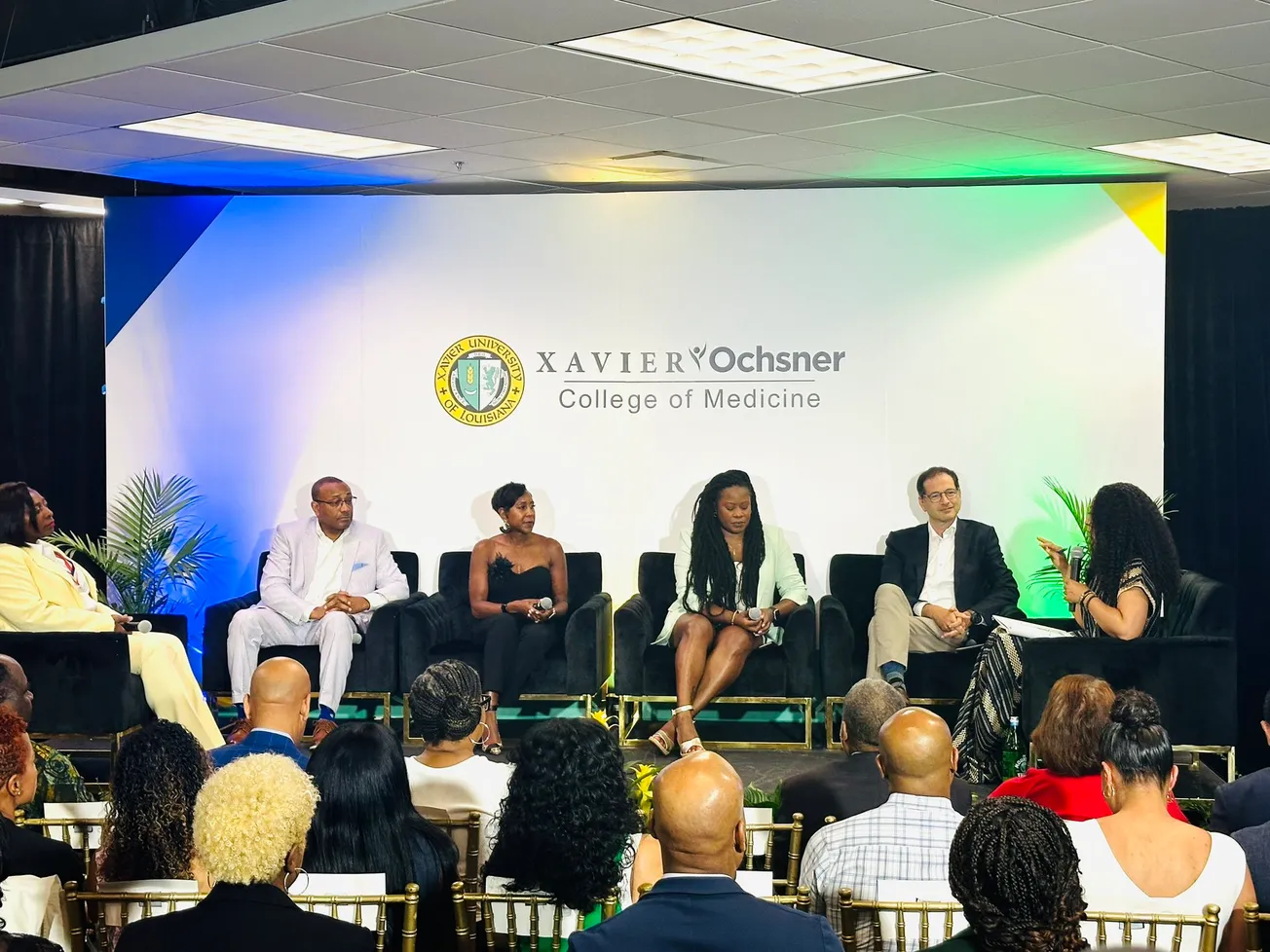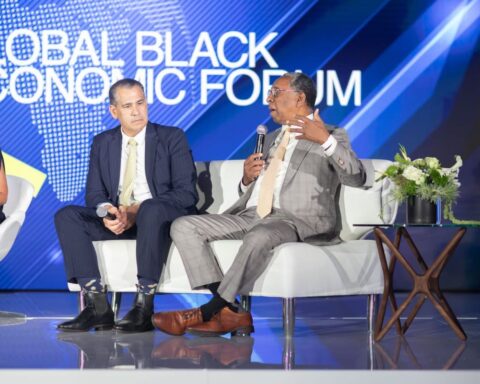By Delatria Palacios
President Dr. C. Reynold Verret and XOCOM Dean Dr. Leonardo Seoane spotlighted challenges and solutions in Black healthcare during a key panel discussion
An engaging and powerful conversation about the future of healthcare equity in America unfolded at the 2025 Essence Festival in New Orleans. The leadership panel featured health experts from Xavier University of Louisiana (XULA) and its forthcoming medical school, the Xavier Ochsner College of Medicine (XOCOM), who addressed the urgent need for inclusion and diversity in the medical field. The event was held in partnership with Essence Festival, a celebration of Black culture that brings hundreds of thousands of attendees to the Crescent City each year as part of the Global Black Economic Forum’s annual Global Business Summit.
The panel featured Xavier University of Louisiana President Dr. C. Reynold Verret and Xavier Ochsner College of Medicine Founding Dean Dr. Leonardo Seoane, alongside Dr. J. Nadine Gracia, CEO of Trust for America’s Health, and Mary E. Stutts, CEO of the Healthcare Businesswomen’s Association. Together, they shared insights, highlighted systemic triumphs and challenges in Black healthcare, and explored the pivotal role HBCUs play in reshaping the medical landscape.
Dr. Leonardo Seoane opened with a clarifying reminder, while XOCOM won’t be the first HBCU medical school in New Orleans, it represents a bold new beginning. He acknowledged the historical contributions of Black medical colleges that were closed in the early 20th century, many as a result of the 1910 Flexner Report, and emphasized the long-term consequences of those closures. The elimination of these institutions contributed to a persistent shortage of Black physicians, a crisis that continues to affect underserved communities across the United States. “There’s a true physician workforce crisis in the United States,” Seoane explained. “We’re short by nearly 86,000 doctors, and the gap is widening. The communities most impacted are often minority communities, and it’s physicians from those communities who are most likely to return and serve them. That’s why HBCUs are so critical—they train the majority of Black and brown physicians in this country.”
With its bold and strategic commitment to improving standards of care and workforce equity, the panelists agreed that launching new HBCU medical schools like XOCOM represents far more than expanding access; it’s about changing the healthcare system itself.
Research shows that Black patients often face poorer health outcomes due to cultural insensitivity and bias within medical settings.
Institutions like XOCOM help bridge those gaps by training physicians who reflect the communities they serve, fostering more compassionate, culturally responsive, and effective care. Dr. Verret emphasized the critical role of research and innovation in advancing this mission. He described medical schools as incubators for the next generation of scholars and practitioners, spaces where compassion, integrity, and community converge to shape the future of healthcare.
“Medical scientists coming out of institutions like XOCOM are the architects of an industry that the United States depends on,” Verret said. “Their work doesn’t just advance medicine—it makes us healthier as a nation. That’s why we must educate and train this talent. If we fail to do so, we do so at our own peril.”
Seoane highlighted a growing trend: more American students are pursuing medical degrees abroad due to limited opportunities at home. He shared meaningful insights into the broader implications of this shift, tying it directly to the national physician shortage.
Given the urgent demand for healthcare professionals, he argued that expanding domestic medical education, particularly through HBCUs, can be a breakthrough. Not only can it address workforce gaps, but it can also ensure that future physicians are rooted in cultural competence, community connections, and purpose-driven care.
XOCOM, unlike any other, is positioned to help reverse this trend while also fueling economic advancement in its surrounding communities. With that goal in sight, the institution is already making notable progress. Ambitiously planning to welcome its first cohort of 50 students in the coming years, XOCOM continues to lay the groundwork, advancing strategic efforts and working toward full accreditation from the Liaison Committee on Medical Education.
Recent investments underscore growing confidence in XOCOM’s mission and its potential to reshape healthcare access and outcomes. The school has secured major financial backing, including $5 million from Bloomberg Philanthropies and $1 million from Pan-American Life Insurance Group. Currently, XOCOM is recruiting for a key executive role: Director of Development. This position will play a pivotal part in expanding the school’s community visibility, engagement, and strategic growth, while also helping to build its academic foundation.
The institution will be located in the heart of downtown New Orleans, within the city’s BioDistrict, and will feature state-of-the-art facilities equipped with cutting-edge medical technology designed to support rigorous academic learning, hands-on training, and interdisciplinary collaboration. As Xavier University of Louisiana (XULA) celebrates its centennial year, it continues to uphold its legacy as a leading producer of Black graduates pursuing advanced degrees in the health sciences profession, further anchoring its role as a national driver of equity and excellence in medical education.
Rooted in a mission to serve communities, the university’s commitment to academic excellence and equity is grounded in its Catholic foundation. In the United States, when XOCOM opens, it will become the fifth HBCU medical school, joining the ranks of:
- Howard University College of Medicine (Washington, D.C.)
- Morehouse School of Medicine (Atlanta, GA)
- Meharry Medical College (Nashville, TN)
- Charles R. Drew University of Medicine and Science (Los Angeles, CA)
For the first time in nearly 50 years, Morgan State University in Baltimore will open a new HBCU medical school this fall, marking a historic expansion in Black medical education. As Dr. Seoane and Dr. Verret have made clear, the work ahead is formidable, but filled with promise. By investing in innovation, education, and community, HBCUs are doing more than training doctors; they are healing systems.


